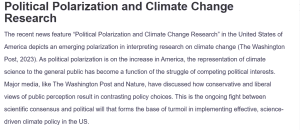Political Polarization and Climate Change Research
The recent news feature “Political Polarization and Climate Change Research” in the United States of America depicts an emerging polarization in interpreting research on climate change (The Washington Post, 2023). As political polarization is on the increase in America, the representation of climate science to the general public has become a function of the struggle of competing political interests. Major media, like The Washington Post and Nature, have discussed how conservative and liberal views of public perception result in contrasting policy choices. This is the ongoing fight between scientific consensus and political will that forms the base of turmoil in implementing effective, science-driven climate policy in the US.
Political polarization in the United States creates divergence in the way climate change research is interpreted and communicated. On the one hand, there is striking agreement among climate scientists that combustion accelerates global warming. At the same time, this apparent consensus is continually contested politically by conservatives, including politicians and media outlets, who do not want the economic implications of environmental regulations and challenge scientific evidence (Pew Research Center, 2020).
At the other end of the spectrum, liberal politicians and their related advocacy groups would be inclined to cite these findings and use them as a stepping stone toward increased environmental policy on investment in renewable energy sources and stronger emission regulations (Edgerton, 2020). In that way, it has almost become an ideologically divided issue where the presentation and interpretation of scientific research are biased by politics and where public understanding and resultant policy measures come out vastly different. This, in turn, turns climate science from an objective tool of information into a subjective tool to help in the advancement of myriad political causes.
The politicization of climate change has also hindered global efforts to institute consistent science-directed policy. Meanwhile, scientific derivation and recommendations call for evidence-based remediation actions. Political influences often lead to belated or watered-down responses, starkly in nations whose economic industrial base is firmly linked with fossil fuel-based energy (Edgerton, 2020).
Overall, the politicization of climate change research turns what was essentially a scientifically based problem into a highly polarized debate, more particularly in countries like the United States. Even with an overwhelming agreement by climate scientists about the human impact of global warming, the way this research is interpreted and put across to the public takes the cue from political agendas on both conservative and liberal sides. This has huge relevance for policy decisions, which are often passed completely, disregarding scientific recommendations. As long as climate science continues to be hijacked for political ends, the quest for a globally binding, effective, and scientifically sound climate policy remains an uphill climb-delays in worsening the challenges presented by climate change.
References
Edgerton, D. (2020). The intimate relationship between science and politics. Nature. https://doi.org/10.1038/d41586-020-02831-8
Pew Research Center. (2020). Politics and science: What Americans think. Pew Research Center. https://www.pewresearch.org/science/2020/10/04/politics-and-science-what-americans-think/
The Washington Post. (2023). Political polarization and climate change: Why it matters [Video]. YouTube. https://www.youtube.com/watch?v=axzEazt-Z8o
ORDER A PLAGIARISM-FREE PAPER HERE
We’ll write everything from scratch
Question 
Discussion Prompt:
Choose and become familiar with a recent news story in which the interpretation of a research study was shaped by political views.

Political Polarization and Climate Change Research
In a post, answer the following:
- What is the name and location of your news story?
- Explain how politics influenced the interpretation of the research in this story.
